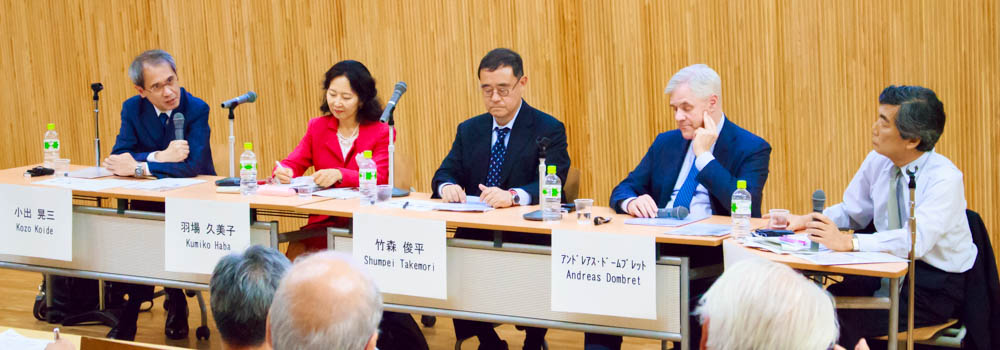Report -
Economic Seminar Series 6
Election Time(s) in Europe
- Challenges on the way to economic recovery
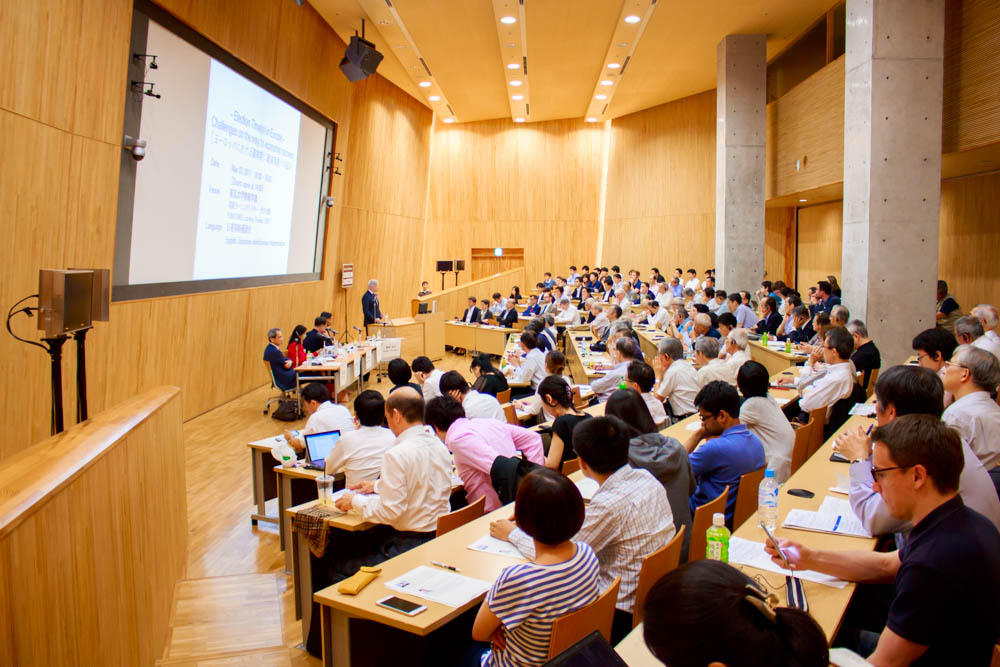
| [Date] | Tuesday, May 23, 2017, 14:30-16:30 |
|---|---|
| [Venue] | FUKUTAKE Learning Theater |
| [Co-organized by] | Policy Alternatives Research Institute, the University of Tokyo (PARI) / Deutsche Bundesbank |
| [Supported by] | Deutsch-Japanischer-Wirtschaftskreis |
| [Language] | English / Japanese simultaneous interpretation |
Program
| 14:30-15:00 | Keynote Speech |
|---|---|
|
Dr. Andreas Dombret, Member of the Executive Board, Deutsche Bundesbank Handout
|
|
| 15:00-15:30 | Statements by the Panelists |
|
Professor Shumpei Takemori, Faculty of Economics, Keio University Presentation slides Professor Kumiko Haba, School of Int. Politics, Economics & Communication, Aoyama Gakuin University Presentation slides Mr. Kozo Koide, Chief Economist, Asset Management One Presentation slides
|
|
| 15:30-16:00 | Discussion moderated by |
|
Professor Naoyuki Shinohara, Policy Alternatives Research Institute (PARI), the University of Tokyo
|
|
| 16:00-16:30 | Q&A |
|
Dialogue with the audience
|
Report
The seminar was co-organized by Policy Alternatives Research Institute, the University of Tokyo (PARI) and Deutsche Bundesbank. It was also supported by Deutsch-Japanischer-Wirtschaftskreis. It was held at Fukutake Learning Theater on Tuesday, May 23, 2017 from 14:30-16:30. The conference room was packed with close to 200 people. The seminar was opened by Prof. Naoyuki Shinohara of the University welcoming the audience and introducing this seminar as the sixth event of the Economic Seminar Series which started a year ago.
Keynote Speech

Dr. Dombret
Speaker: Dr. Andreas Dombret
Member of the Executive Board, Deutsche Bundesbank
Dr. Dombret stated that protectionism and confrontational politics pose a threat to security and welfare of the nation state. Since the financial crisis, the pace of recovery in the EU area has been slower. Also, the EU labor market indicates that about 15-18% of the workforce is either without jobs, or they would like to work more. Therefore, closer inspection of the EU area economy shows that a lot still remains to be done to move it into a sustainable path. That gives an indication as to why protectionism is on the rise. He explained that ever since the Brexit vote in the UK, national as well as regional elections in many EU countries have seen populist parties on the rise. Economically, a growing percentage of people seem to be voting against globalization.
He further added there are two root causes of the rise in populism, national identity and economic distribution. Economic distribution means that any economic change will create winners and losers, and unless those on the losing side find opportunities to offset their losses, they have an incentive to oppose change. There are two main factors responsible for rising political opposition: globalization and technological change. Many attribute the rise in populism to a desire for greater protectionism of domestic industries. This seems to be true in the Brexit vote as well as recent US and French presidential elections. He stated it is often argued that free trade puts workers of specific industries out of a job and that rising international competition leads to lower wages and inferior working conditions. In sum, free trade boosts overall welfare, but it also affects many people negatively.
Next, Dr. Dombret remarked that while some technological change and digitalization have delivered massive welfare gains for our societies, there is growing evidence that technological change also means losses for parts of workforce. Therefore, apart from the benefits, globalization and digitalization have had negative effects for a significant number of people. These individuals together become a group that can be easily mobilized because they are frustrated. For Dr. Dombret, the real challenge is how to harvest the fruits of trade and technological change in a market economy without breaking down societies’ social cohesion. He suggested two things with respect to the degree of international cooperation. First is finding mechanisms that help those who lose from international trade. Second is, with respect to cooperation within the European Union, the aim should be to make EU better so it works for everyone through policies that help those on the losing side of a redistributive and restructuring tendencies. This could include implementing more sustainable growth enhancing policies such as in child welfare and healthcare.
In conclusion, Dr. Dombret emphasized the need to tackle these challenges sooner rather than later because populism has a strong base among economically frustrated individuals.
Statements by the Panelists
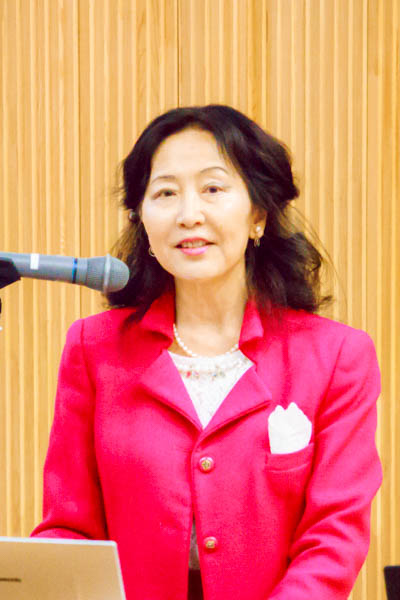
Prof. Haba
Professor Kumiko Haba
School of Int. Politics, Economics & Communication, Aoyama Gakuin University
Professor Haba spoke about the rise of populism in Europe. She stated that there has been a global power shift in the 21st century from developed country to emerging powers, especially China and India. In the last 17 years, several turning points have taken place for this shift in power. Increasing border and territorial conflicts in Asia, Europe, and the United States is the first point of the beginning of populism. She stated that more than million refugees are entering Europe, fueling border conflicts. Further, increasing frustration level of the middle class is giving rise to nationalism and xenophobia even in countries with strong human rights. As a result, homegrown terrorism in Europe has started. However, on the positive side, in Austria, Netherlands, and France, the radicals have not succeeded in recent elections.
To solve this problem, Professor Haba feels that, first, one must consider the power shift in declining middle class between developed countries and emerging countries. Secondly, inclusion of the minority is one of the most important key to stability in the society. Further, she remarked that collaboration system between, say, EU and Asia might be important in confidence building between the regions.
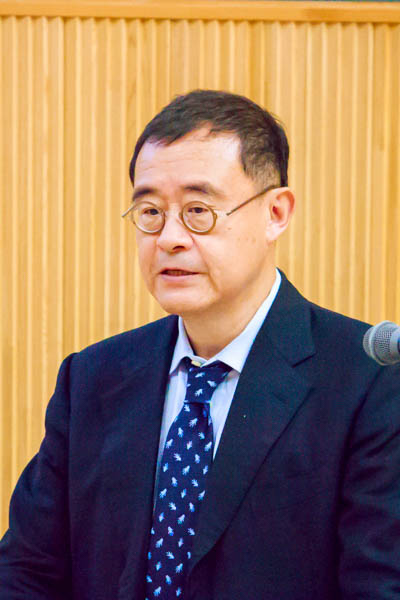
Prof. Takemori
Professor Shumpei Takemori
Faculty of Economics, Keio University
Professor Takemori concentrated his comment on the question of Eurozone and the north-south divide. He explained that German economy is characterized by savings surplus, while in case of Italy and France, they have savings deficit, which makes Italian and French companies vulnerable to interest rate hike. The interest rates are related to the confidence of French and Italian governmental bonds. This is severe in French case because France has many public companies. The situation is probably worse for Italy because the vicious cycle between deterioration of country' creditworthiness and the banks' safety concerns is progressing. Oppressed by the accumulation of bad loans, Italian bank lending is currently stagnating.
Professor Takemori then talked on what will happen in Euro when German inflation rate reaches over 2%. From the German side, there will be pressure on ECB to take action, and ECB will have to decide between inflicting pain on north or on south. He added that central bank policy should be politically independent, but in this case, it is difficult to avoid any political implication because one half of the board members of the ECB are lenders while the other half is borrowers. In such scenario, he cautioned that Europe must avoid the conflict from widening open.
However, he remarked that southerners are gaining upper hand over northerners at EU on account of Brexit. He concluded by stating that while the European economy is still recovering, the situation is still not as great as it was in the past.
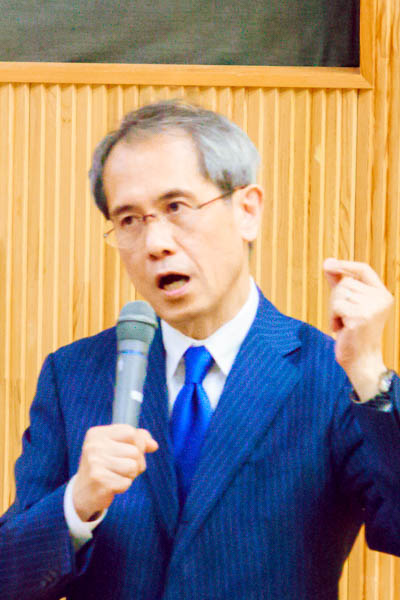
Mr. Koide
Mr. Kozo Koide
Chief Economist, Asset Management One
Mr. Kozo Koide pointed that in EU countries, due to different economic fundamentals, some countries’ real interest rate is high while for others it is low. Even if extreme easing of the mandatory policy is continued by ECB, it will still put pressure on countries such as Portugal, Italy, and Greece aggravating the balance sheet adjustment issue. He explained that as a whole, the non-performing loan ratio will stay down to 5.4%, but for many heavy indebted EU countries, the ratio is more than 15%.
Next, Mr. Koide added that in Europe, relatively stringent asset classification under stress testing has brought more healthy and transparent situation in banking system, but a large part of the solution has been still restricted to indirect charge-off. Around 75% of outstanding amount of cross-border credit derivatives last year in Europe suggests the share of unbalanced bad asset hedged by derivatives is still large.
Further, while bank union in Europe has been established after the debt crisis, its structure is still transitional. Primarily, each sovereign government has the responsibility for the solvency of each bank. Therefore the capacity to rescue bad banks could be tested when the size of the bank is large. This is primarily because while ECB can supply liquidity to the banking system, it cannot inject capital.
Next, touching on European government bond market, Mr. Koide explained that each government bond is moving independently in recent months. So in the future, high causality may be revived when there is shaky situation in the banking system in Europe or during election period. In conclusion, he remarked that market is watching whether Euro area is harnessing integration or is heading for gradual disintegration, which could be a catalyst for the change of political union in the future.
Discussion
Moderator: Professor Naoyuki Shinohara
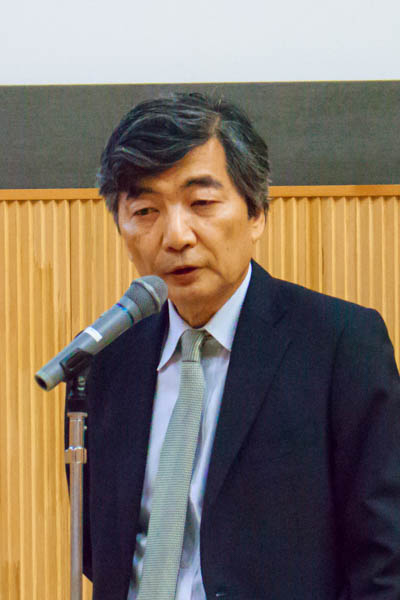
Prof. Shinohara
#1: Where will European integration, including the European community and the Euro system, be in 5 years?
Dr. Dombret replied that the European Union, the EU 27 as well as the Eurozone, will be closer than they are now in 5 years.
Prof. Takemori feels that in 5 years, the European integration problem will hang on without having a real breakthrough.
Prof. Haba explained the EU integration depends on the behavior of German Bundesbank and ECB. However, European citizens will learn from Brexit and Donald Trump and so EU will continue.
Mr. Koide is positive that the EU integration will be strengthened through political process.
#2: How can countries that don’t have enough budget under the strict EU rules to spend on sustainable growth-enhancing policies such as health care to tackle populism? A case for fiscal union?
Dr. Dombret stated that the answer is through reprioritization of efforts and through long-term structural investments. If the European countries agree on the right set of instruments, there will be financing for this in the future helping each and every country. He added that fiscal expansion is not the only solution. If there is a very high debt level and a demographic challenge, the higher debt will be burdened by less people, which is not advisable.
#3: How to address the issue of populism, nationalism, and xenophobia?
Prof. Haba explained that in the 21st century, globalization attacked developed countries because of the rise of emerging countries. So, to make the financial pie bigger in an aging society, first, one should think about immigrants as contributors to prosperity, and second, collaboration with emerging powers should be embraced by advanced countries.
Prof. Takemori added that some doses of cold shower may be necessary to counter populism. He explained that cities like Cardiff voted for Brexit believing they can take things under their control, which is just an illusion. He believes that England will face terrible time after 2019. Similarly, Trump won by promising major recovery and reforms, but the fact is his popularity is already declining.
Mr. Koide believes the definition of populism is when the losers in the system becomes majority, the politicians just accommodate their opinions. This might invite serious situation as in the United States or in France. In such cases, it is very hard to solve the situation just by claiming economic efficiency.
#4: What are the elements needed to strengthen the European system? Ask Dr. Dombret to explain the current state of banking union.
Dr. Dombret answered it is a logical step to harmonize bank supervision since there is only one currency. With regard to bank supervision, there is the single supervisory mechanism working with the national competent authorities. The new system is more complicated but more effective. Next, on the issue of bank resolution, since the beginning of last year, the single resolution board has been present with single set of rules, which is a big progress though not tested yet. Thirdly, regarding deposit insurance scheme, the economic policies in the 19 member states of the Euro area are still different, and the first step is to narrow the gap with regard to these different economic policies in the Euro area.
Prof. Takemori stated even after the British referendum, he is yet to see a concrete example of Europe solving some fundamental problem, and hopes that in future a fundamental solution for Greek bailout is arrived at.
Prof. Haba emphasized the need to harmonize EU public policies as exclusion policy like populism creates conflict and instability. She added that collaboration and harmonization of economy along with stability and prosperity will provide a solution.
Mr. Koide informed that a retired board member of Bundesbank had told him it would take at least two decades to have a real bank union in Europe. Therefore, the steps taken in banking regulation should be evaluated positively.
Question and Answer Session with the audience
Moderator: Professor Naoyuki Shinohara
Q: What does the concept of multi-speed integration means for Germany and whether the concept will enhance or lower the momentum for further fiscal integration?
Dr. Dombret stated that the multi-speed integration is not ideal. However, multi-speed integration reflects the fragmentation of stages of development in certain countries and that's why this is a plausible concept. This concept, needless to say, is clearly outside of monetary policy.
Q: What are the suggestion to solve youth problems as touched upon in your speech?
Dr. Dombret responded that the youth should learn as much as possible. Policies should also support the youth by giving appropriate offers and making learning affordable. He emphasized that youth should be flexible to internationalization which is needed in an ever-changing economic environment. Further, he added that youth unemployment in Germany is extremely low, because the economy is doing well. This means many new opportunities are being created for youth. However, Germany is facing demographic challenge. Therefore, the youth should be flexible and adapt to new situations.
Q: After the Brexit, how will European banking system deal with services that are currently being provided through UK? Where should Euro clearing be conducted?
Dr. Dombret explained that he does not comment on decisions of the governing council as he is a board member of the Bundesbank. However, one way of doing this is by equivalence system whereby UK will create a legal system which is equivalent to the European system, but this is not a viable option. There are other possibilities, but he would not want to speculate. He added that a decision will be made in the European central bank in due course.
Q: How should European economic or political leaders explain the refugee crisis so their countrymen are able to think rationally on the issue?
According to Dr. Dombret, immigration problem is a reason for frustration and populism in Europe. One reason is some parts of society want simple answers on complex questions, which is rarely true. He points out that populists are not necessarily for or against immigration, but their sentiment is a combination of being left behind and looking for simple answers.
Prof. Haba responded that even in EU, the personal interest of the middle class who fear the future, social security loss, and guarantee of life needs to be taken into consideration. If not, populist elements will exploit the middle class. That is the reason why public policies of political scientists and economists are important.
Q: What is the reason for Germany’s confidence in accepting millions of immigrants while Japan still suffers from ambiguous feeling from WWII history?
Dr. Dombret emphasized that refugees should not be confused with guest workers as refugees are people who have lost everything. Everybody who accepts refugees does not do this with an economic calculation in mind, but out of the feeling to help people who have lost everything.
(note) The responsibility for the wording of this summary report lies solely with Prof. Naoyuki Shinohara.
